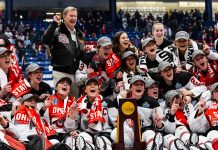Just how significant was the 2009-10 season for the Merrimack Warriors? Consider this:
• Last year’s sixth place finish was the best league finish for Merrimack since the 1996-97 team that finished fifth in a nine-team league.
• Merrimack’s playoff win over Boston University was the team’s first since an eighth-place Warriors team upset top-seeded BU in a best-of-three series in 1998. It was only the third postseason win since joining Hockey East.
• Last year’s 12 league wins was an exponential improvement from years past. In 2006-07, the team had three wins total; in 2004-05, Merrimack had just one win in Hockey East.
There is definite reason for optimism for the Warriors. Coach Mark Dennehy, though, is hardly ready to rest on his laurels.
“It wasn’t a great season for us as much as it was a great step forward for us,” Dennehy said. “We still did not achieve a lot of our goals. So as content as we were with how much improved we were, there’s still a lot left to be done.”
Because of that, Dennehy may have been harder on his team than ever in the offseason. He understands human nature’s natural drive toward being happy with improvement and knows that not continuing to improve would only be a step backward.
“Coming back this year, I wanted to make sure our mind-set and our work ethic remained intact,” Dennehy said. “So far, I’ve been happy with them. I don’t think there’s a player on our team that hasn’t improved his physical conditioning. That’s a sign that there’s a seriousness of purpose within the organization.”
Though on-ice X’s and O’s and learning and adopting systems will lead to continued improvement, Dennehy feels the primary area that needs to be improved isn’t on the ice.
“I think it’s confidence,” said Dennehy, who felt his team was confident at home, posting a 12-3-1 record at Lawler Arena as opposed to a 4-15-1 mark on the road. “We’re obviously confident at home and beat some of the best teams in the country. On the road, where and when we were unsure of ourselves at times, we really struggled.
“We’ve worked really hard to feel as if we’ve belonged. The good news is we do. The bad news is we do. We’ve got to recognize that as a team. When we play with confidence and play our style of hockey, it doesn’t matter where we play.”
One thing that will matter is performance among the team’s top players. The Warriors will rely heavily on their returning offensive talents, most notably Stephane Da Costa, whose return after a 46-point rookie campaign was highly touted in the offseason by the club.
There also will be the need for continued improvement of Joe Cannata, who is the only returning goaltender with experience.
“I think Joe Cannata has sort of floated under everybody’s radar,” Dennehy said. “He’s usually at his best when the lights are brightest. One of his goals is to play every game for us this year.”
Should the pieces come together for the Warriors, continued improvement could mean more milestones for the program. The 2009-10 season was certainly a nice step forward. This campaign will show just how steady this team can be once it gets on its feet.


